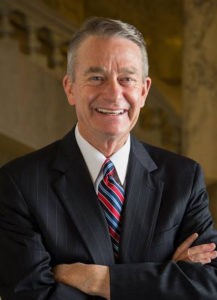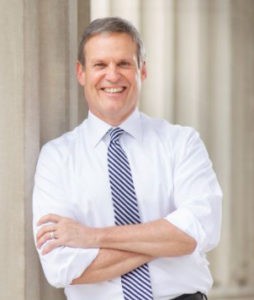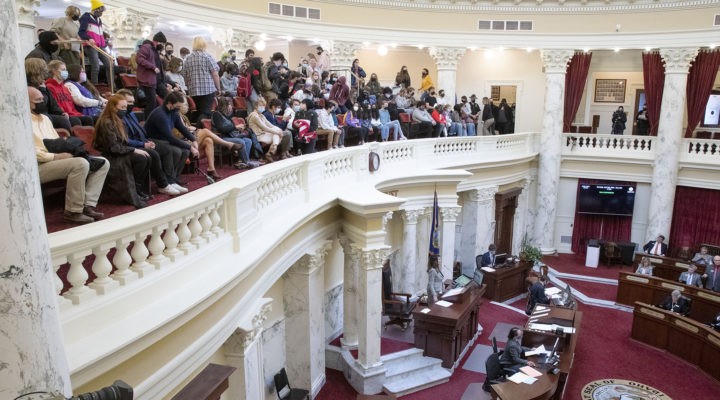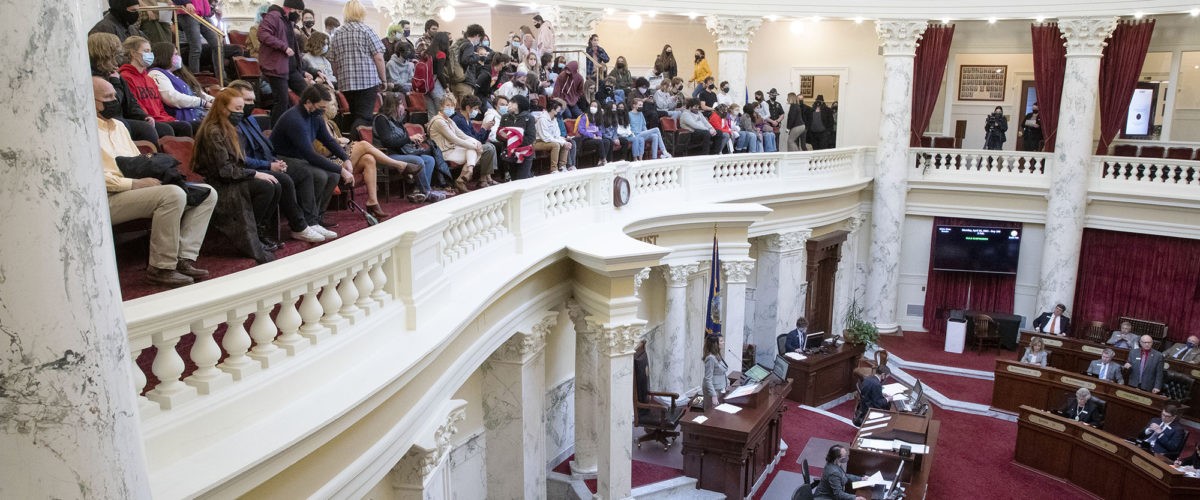Southern Baptist seminary presidents aren’t the only ones up in arms about Critical Race Theory. Their affirmation that the six SBC seminaries will not teach about systemic racism and inherent injustices is sweeping Republican-led state legislatures this year.
Bills in at least a dozen states seek to prevent public school and charter school teachers from engaging in conversations about race, racism and slavery — even as part of their lessons on American history.
A common theme among legislators proposing such bills is that talking about race and racism is “divisive” and therefore should not be tolerated.

Brad Little
A bill passed and signed into law by Gov. Brad Little in Idaho declares that tenets found in Critical Race Theory “undermine,” “exacerbate” and “inflame divisions” in ways that are “contrary to the unity of the nation and the well-being of the state of Idaho and its citizens.”
Also key in the Idaho legislation is a ban on teaching “that individuals, by virtue of sex, race, ethnicity, religion, color or national origin, are inherently responsible for actions committed in the past by other members of the same sex, race, ethnicity, religion, color, or national origin.”
American exceptionalism
Tennessee is the latest state to pass such a ban, signed into law May 24 by Gov. Bill Lee, who said students should be taught about American “exceptionalism” rather than Critical Race Theory.

Bill Lee
“We need to make sure that our kids recognize that this country is moving toward a more perfect union, that we should teach the exceptionalism of our nation and how people can live together to make a greater nation,” he said, “and to not teach things that inherently divide or pit either Americans against Americans or people groups against people groups.”
A similar bill under consideration in Rhode Island would prevent schools from teaching that Rhode Island or the United States “is fundamentally racist or sexist.” The bill lists multiple bullet points in its “prohibition of teaching divisive concepts.”
Among those is a ban on suggesting that “an individual, by virtue of their race or sex, is inherently racist, sexist or oppressive, whether consciously or unconsciously.” And a ban on this: “Meritocracy or traits such as hard work ethic are racist or sexist or were created by a particular race to oppress another race.”
In sum, the bill says it bans “the teaching of divisive concepts and shall prohibit making any individual feel discomfort, guilt, anguish or any other form of psychological distress on account of their race or sex.”
Oklahoma governor worries about Chick-fil-A sauce
In Oklahoma, Republican Gov. Kevin Stitt signed into law that state’s ban on teaching about racism May 7, just days shy of the 100th anniversary of the Tulsa Race Massacre, the deadliest single attack on Black citizens in American history.
“Now more than ever, we need policies that bring us together, not rip us apart,” Stitt said via Twitter. “As governor, I firmly believe that not one cent of taxpayer money should be used to define and divide young Oklahomans about their race or sex. That is what this bill upholds for public education.”
It also forbids schools from teaching that people are inherently racist, sexist or oppressive due to their race or sex.
The Oklahoma law bans Critical Race Theory, but not by name. Like the bills in other states, it prohibits teachers from lessons that could cause students to feel uncomfortable or responsible for actions their race or sex committed in the past. It also forbids schools from teaching that people are inherently racist, sexist or oppressive due to their race or sex.
Yet the Oklahoma State Department of Education has not received any complaints of districts teaching the ideology in local schools, reported The Okahoman. “None of the department’s regional accreditation officers, attorneys or other agency officials who take complaints from educators and parents have heard reports of any schools teaching the subject.”
The new law is a “solution looking for a problem which does not exist,” Sean McDaniel, superintendent of Oklahoma City Public Schools, told the Oklahoman, which reported: “Legislative Democrats called the law a political stunt designed to help Republicans get re-elected.”
 A few days after signing the bill into law, Stitt released a fundraising appeal portraying the Chick-fil-A “sauce shortage” as more important to Oklahomans than Joe Biden’s “woke liberals” and “out of touch, radical, socialist agenda.”
A few days after signing the bill into law, Stitt released a fundraising appeal portraying the Chick-fil-A “sauce shortage” as more important to Oklahomans than Joe Biden’s “woke liberals” and “out of touch, radical, socialist agenda.”
In fact, the governor said, the Chick-fil-A sauce shortage was caused by Biden’s policies. And now, “the liberals are out to get me” because “they know I am a direct threat to his socialist agenda and they’re prepared to spend millions to stop me.”
Meanwhile, Stitt’s office staff told The Oklahoman they have heard widespread support for the new anti-race teaching law.
False accusations at Boise State
Similar charges of white students being persecuted have been made at colleges and universities across the country, where there is more likelihood of teaching or discussion about the actual topic of Critical Race Theory. In one high-profile case, Boise State University this spring suspended dozens of sections of a diversity and ethics course based on allegations from a “concerned community leader” that a student had been made to feel “humiliated and degraded” in class “for their beliefs and values.”
However, the Chronicle of Higher Education reported May 25 that the alleged incident likely didn’t happen. An outside law firm investigated the incident and said it couldn’t substantiate the story.
After interviewing students and creating an open channel for any concerned student to come forward, the firm found that, contrary to the initial report, no student had been forced to apologize in front of a class for being white or for having white privilege, nor had such a student been taunted and called names by other students.
‘Whitewashing history’
Efforts in Oklahoma, Idaho, Tennessee and other states to restrict classroom conversations about race and racism as historical realities wrongly imply that Critical Race Theory is being used in elementary or even high school education, Jazmyne Owens told CBS News.

Jazmyne Owens
Critical Race Theory is not typically taught in elementary and secondary schools “because it is based in legal theory,” said Owens, of the public policy think tank New America. She said the wave of legislation “is really aimed at erasing and whitewashing American history.”
For example, a bill that has passed the Texas House bans discussion of white privilege and white supremacy, she said. “In the long term, bills of this nature, and those that intend to censor the way that race and systemic racism is discussed in the classroom, are way more harmful to students.
“Protecting education means being honest about the parts of our history that hurt, particularly chattel slavery, and being proactive in ensuring that we end current reproductions of racism and inequity in classrooms and beyond,” Owens said.
Kimberlé Crenshaw, a founding critical race theorist and Columbia Law School professor, told ABC News the concept of Critical Race Theory is being misrepresented and used as a political tool.
Critical Race Theory, she said, is a discipline that seeks to understand how racism has shaped U.S. laws and how those laws have continued to impact the lives of non-white people, ABC reported.
Trump and the SBC
Yet stopping Critical Race Theory — which most Americans never had heard of a year ago — was a political talking point for former President Donald Trump, tapping into the fears of his largely white base of supporters.
During his last year in office, Trump issued two executive orders, one calling for “patriotic education” and a one banning diversity training and training on Critical Race Theory for federal workers and federal contractors.
Trump particularly took aim at the 1619 Project, the Pulitzer Prize-winning New York Times Magazine project that details the history of American slavery and how it has shaped the national consciousness.
“Critical Race Theory, the 1619 Project and the crusade against American history is toxic propaganda, ideological poison, that, if not removed, will dissolve the civic bonds that tie us together, will destroy our country.”
“Critical Race Theory, the 1619 Project and the crusade against American history is toxic propaganda, ideological poison, that, if not removed, will dissolve the civic bonds that tie us together, will destroy our country,” Trump declared.
Soon after Trump found political response to his two executive orders, the presidents of the six SBC seminaries issued their own declaration against Critical Race Theory in November 2020. They said such teaching is incompatible with the SBC’s doctrinal statement, the Baptist Faith and Message.
That sparked an outcry especially from Black pastors within the SBC, prompting several to resign positions or to leave the denomination entirely. This issue likely will come up again at the SBC’s annual meeting in Nashville in June.
Court challenges ahead
The spate of new laws passed in state legislatures stand a good chance of being ruled unconstitutional as violations of free speech, Joe Cohn, legislative and policy director at the Foundation for Individual Rights in Education, told The Atlantic.
“Of the legislative language so far, none of the bills are fully constitutional,” Cohn said. “And if it isn’t fully constitutional, there’s a word for that: It means it’s unconstitutional.”
Yet that reality has not deterred Republican strategists nationwide, who appear to be singing from the same hymnal.
In Utah, a coalition called Utah Parents United attempted to pressure Utah lawmakers to ban Critical Race Theory during a May special session that was intended to focus on allocating federal coronavirus relief funds.
That pressure failed, however, when Gov. Spencer Cox “refused to put the issue on the legislative agenda, explaining that such a hot-button issue deserves more time and deliberation than a whirlwind special session could afford,” reported the Salt Lake Tribune.
Despite the governor’s resistance, Utah legislators called themselves into an “extraordinary session” where they passed resolutions stating that Critical Race Theory concepts “degrade important societal values” and have no place in Utah’s classrooms.
All 17 House Democrats walked out of the chamber to protest the position statement, which they condemned as “political theater,” the paper reported, and in their absence, the resolution passed unanimously in the House.
Related articles:
Could you win a quiz show by defining ‘Critical Race Theory’?
Speaker at Baptist college warns that Marxist thought is creeping into SBC seminaries
Juneteenth should remind us of all the things we don’t know | Opinion by Mark Wingfield
When did ‘woke’ become a four-letter word? | Opinion by Greg Garrett
You want Patriotic Education? Look what it’s done for Cuba | Opinion by Russ Dean


